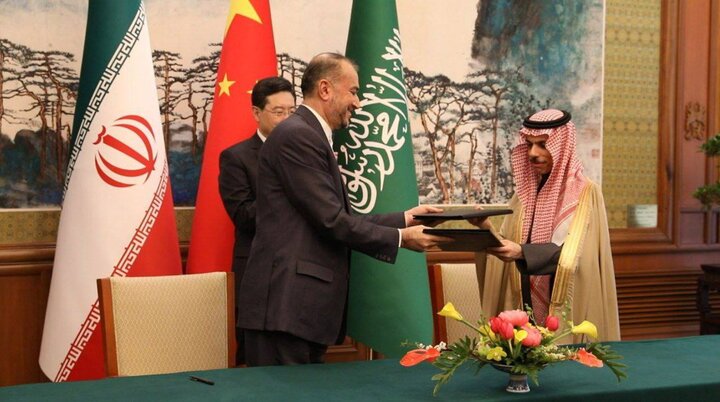On Sunday, just days after Saudi Aramco publicized a multibillion-dollar investment in China’s petrochemical industry, Saudi Arabia and its OPEC+ partners announced a surprise cut to oil production.
Alongside the recent China-brokered agreement for Iran and Saudi Arabia to resume diplomatic ties, these developments typify an ongoing transition: America is stepping back, and China is stepping up in the Middle East.
Coming a day after Xi Jinping officially secured a third term as China’s president, the announcement of the Saudi-Iran deal had two messages.
First, China under Xi had completed its evolution from a regional to a global power.
Second, China would be a peacemaker, solving problems the United States would not or could not address.
Both messages amount to a play for leadership of the Global South, and are part and parcel of Xi’s effort to forge a new world order.
That order will see US power and influence diluted and America’s alliance network severely weakened, if not broken altogether.
There are two main justifications for the United States’ withdrawal from the Middle East.
First, over a period of decades, the United States has spilled significant blood, treasure and diplomatic resources to maintain regional stability, often with results deemed unsatisfying.
As Chinese power catapulted to new heights over the last 15 years, administrations beginning with Barack Obama’s began calling for a reorientation of US foreign policy.
Deep engagement in the Middle East was, the argument goes, no longer worth the costs; American resources could be better put to use in the Indo-Pacific.
Second, opponents of Middle East engagement claim fracking has allowed Americans to rely on North American petroleum production, and the transition to carbon-neutral energy is reducing the US reliance on fossil fuel anyway.
Therefore, the United States need not concern itself with foreign oil.
Neither of these arguments holds up.
The Middle East should be properly understood, in part, as an arena for US-China rivalry.
It is no mystery why Beijing is expanding its influence in the region.
First, oil is and will remain a crucial global commodity.
As the recent hikes in both energy and non-energy goods’ prices show, inflation in the United States is significantly dependent on political and economic developments elsewhere.
The same goes for China and US allies, all of whom love Middle Eastern oil.
In the Indo-Pacific, American allies appreciate the new attention they’re receiving from Washington but feel uneasy about the prospects for order in the Middle East.
Instability there would have serious effects on their economies.
That’s not their only worry; dominance of the Middle East by a hostile power is equally troubling.
China aims to secure maritime checkpoints, and commanding the Persian Gulf is key to its global strategy.
Iran and China are enacting a 25-year security agreement rumored to include Chinese access to naval facilities in or near the Persian Gulf.
Saudi Arabia, worried that the United States is unreliable, is seeking out new friends.
Israel, the only stable liberal democracy in the region and a tech hub key to US interests, is also hedging its bets by expandingties with China.
These changes mean US policy on China must pay serious attention to the Middle East.
Should Chinese power in the Middle East advance as American power contracts, Beijing will not only put itself in a position to hold the global economy hostage but may also become handmaiden to a far more violent region.
With only limited experience navigating the Persian Gulf’s intricate politics, no track record of developing serious peace proposals and little concern about the internal behavior of existing regimes, domestic and international conflicts may become ever more violent and intractable.
In other words, while China may acquire the means to stop the flow of oil out of the Middle East, that oil might also stop flowing for reasons that arise from the nature of Chinese hegemony and are yet beyond China’s control.
Such an eventuality would put US security and prosperity at risk, necessitating a renewed American intervention in the Middle East and raising the specter of a direct US-China confrontation.
China’s operations have clearly become global in scope.
Washington cannot adhere to a limited geographic framing of its rivalry with the Communist regime.
Beijing’s control over Middle Eastern energy will increase China’s leverage over America’s Indo-Pacific and European allies and partners.
Chinese hegemony in the region, moreover, could breed even far greater instability, with global implications.
Continued, deep American engagement in the Middle East is a prerequisite to counter an increasingly assertive and aggressive People’s Republic of China.
Michael Mazza is a nonresident fellow at the American Enterprise Institute, the Global Taiwan Institute and the German Marshall Fund of the United States. Shay Khatiri is a senior policy analyst at the Jewish Institute for National Security of America.
Originally published in the New York Post.

